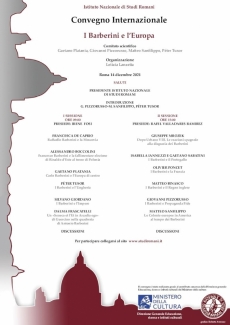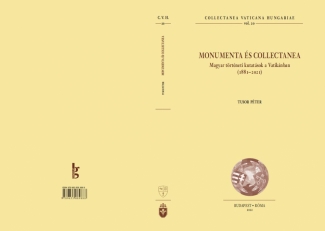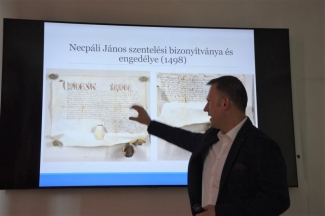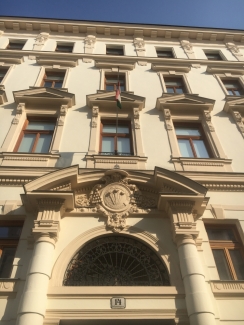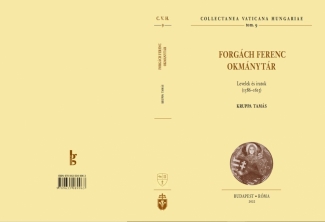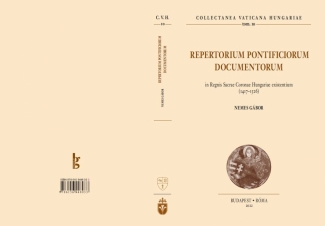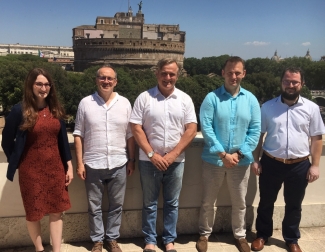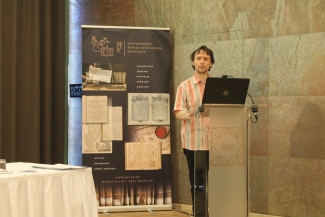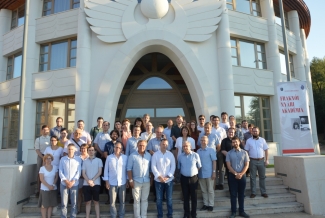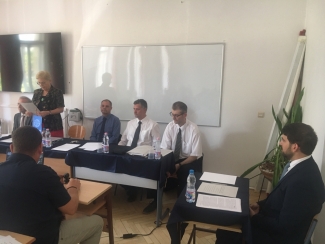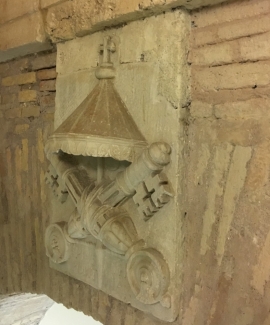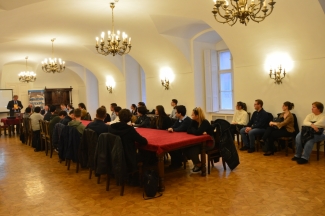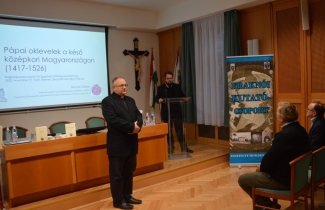On 14th of December 2021 leader of the Research Group Péter Tusor participated in an online conference namely Barberini e l'Europa which was organized by Università di Chieti, az Università della Tuscia and MTA-PPKE Fraknói Research Group. The Italian Spanish, French and Hungarian participants analyzed Barberini's effects on baroque art and politics. Based on newly explored sources apart of Urbano's VIII pontificate lecturers introduced Antonio (1569–1646), Francesco (1597–1679), youngest Antonio (1608–1671), Carlo (1630–1706) and Francesco (1662–1738) Barberini's career. Péter Tusor presented Barberini dinasty's often difficult relation with the Hungarian Kingdom during the 17th century.
Above-mentioned lectures are going to be published in Acta Barberiniana by Edizioni Sette Città.
2022
-
2021. December 14.2286
-
2022. February 28.
Series Collectanea Vaticana Hungariae new volume I/20. namely Monumenta és Collectanea. Magyar történeti kutatások a Vatikánban (1881–2021). has been published at the end of February 2022. Péter Tusor, leader of Vilmos Fraknói Vatican Historical Research Group, wrote this book which presents precisely Hungarian historical research movements in Rome and Vatican from the beginnings until nowadays. The aforementioned volume's antecedent has been published as a prologue for Research Group's first volume (CVH/1). This volume summarizes the great historian, Vilmos Fraknói's heritage and mission of a modern historical research institute. Here you can get the book.
2264 -
2022. March 24.
The Fraknói Research Group held its sixth workshop on 23 March 2022 at University of Pécs (PTE) where the volume Ordinationum Documenta Pontificia de Regnis Sacrae Coronae Hungariae (1426–1523) ( CVH I/18) was presented by the editor Tamás Fedeles. The event's place was symbolic because years ago the first first workshop was held at the same place. Before it Péter Tusor, leader of the Research Group congratulated Fedeles for his Academic Doctorate.
Presented book focuses on the Hungarian Medieval clerics ordination in Rome.
The volume in question includes altogether 1001 entries, which contain the documents related to 783 persons’ promotion. This newly published outcome is one of the most important results of the last five-year tender.2306 -
2022. March 22.
Péter Tusor, leader of the Fraknói Research Group gave a lecture entitled Pázmány Péter, a politikus (Péter Pázmány, the politician) at Collegium Pazmanianum in Vienna. Based on Roman sources Tusor analyzed Pázmány's cardinal promotion's, the European political circumstances and the relationship between the Holy See and Imperial Court of Vienna. Tusor highlighted Cardinal Pázmány's Imperial embassage to Rome in 1632 as one of the biggest diplomatic conflict in the Eternal City during the seventeenth century. Therefore the consequences were also significant which changed the modality of the relation between the mentioned two European power. After that lecture Tusor gave an interview on ORF.
See more here
2304 -
2022. May 3.
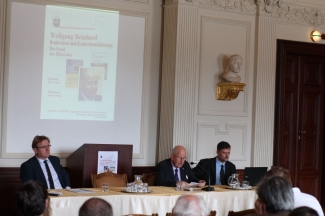
Five years ago today, on 3rd of May 2017 Wolfgang Reinhard gave a lecture at Hungarian Academy of Science's headquarters in Budapest. That event was his first official lecture in Hungary.
Professor Reinhard's lecture „Konfession und Konfessionalisierung. Der Stand der Diskussion” was translated to Hungarian by András Forgó docent at University of Pécs. Soon former MTA-PPKE 'Lendület' Church History Research Group (2012-2017) published Reinhard's lecture 'Felekezet és felekezetszerveződés. A tudományos diskurzus fejleményei' . This issue was the first fasciculus in Collectanea Studiorum et Textum's III series. Hungarian and English news about the event are available on mta.hu .Professor Reinhard was born in 1937. His research area is the early modern ages. He invented with Heinz Schilling the model of confessionalization which was the most important paradigm shift in Church history since Leopold von Ranke and Max Weber.
The same event was the closing event of the five-year-project of MTA-PPKE Church History Research Group. Péter Tusor, leader of the mentioned Research Group has announced on that afternoon that Vilmos Fraknói Research Group (2017-2022) has been established for the next five-years-project term as the successors of 'Lendület' Group.
From 1st of July 2022 Vilmos Fraknói Research Group is going to continue the professional work as ELKH-PPKE-PTE Vilmos Fraknói Vatican Historical Research Group.
2516 -
2022. April 29.
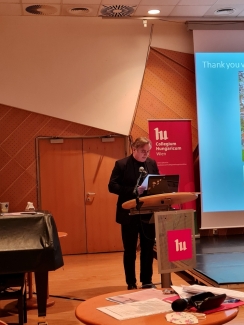
On 29th of April 2022 Péter Tusor leader of the Fraknói Research Group and Róbert Oláh P. research fellow gave lectures at an international conference 'Höhere Bildung in den Jesuitenschulen Mitteleuropas am Beispiel der Universität von Tyrnau' in Vienna. The conference main goal was to highlight the influences of the University of Trnava and Jesuit Order on Habsburg Empire. Péter Tusor based in Vatican sources showed in his lecture the process of the foundation of University of Trnava in 1635. After that at the end of the session Róbert Oláh P. analyzed by the method of prosopography the academic background of Canons of Győr between 1658 and 1783.
After the end of the lectures scientifical discussion was continuing vigorously.
3371 -
2022. May 7.
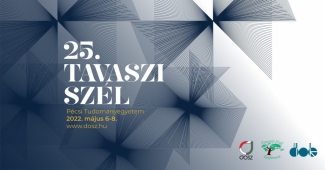
On 7th of May 2022 György Sági assistant research fellow participated in a conference "Tavaszi Szél" which was dedicated to doctoral candidates. This yearly conference this time was transferred to Pécs. György Sági gave a lecture about the abolition of the Seminary of Kalocsa by the Communist Government in the early 1950's. (Egyházmegyés papok képzésének megszűnte, illetve áthelyezése Kalocsáról Szegedre az 1950-es évek elején).
Mentioned lecture above highlighted the weekdays and trials of the seminarists and clerics during the anticlerical Communist Era in the Archdiocese of Kalocsa-Bács. Apart of the written sources from archives Sági used several oral history sources by the old priests.3370 -
2022. May 4.
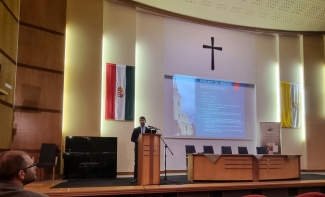
On 4th of May 2022 Archdioceses Library and Archives of Veszprém organized a conference "A veszprémi püspökség története 1777–1850" at Archbishop's College of Veszprém. On this occasion Viktor Kanász Research Group's research fellow gave a lecture about 18th century's schoolmasters in Veszprém Diocese. Kanász's lecture based on contemporary sources especially on Canonica Visitatios. In his presentation Kanász analyzed more than 120 schoolmasters' academic background and career.
2415 -
2022. May 15.
The latest volume of the Collectanea Vaticana Hungariae, (CVH II/9.) containing the selected political correspondence of Ferenc Forgách, has been published. Forgách’s correspondence and his politics started at the same time as István Bocskai’s uprising, which is one of the most contested periods of Hungarian history in the 17th century. The volume is the result of research in foreign archives that began decades ago. The published sources are mainly from the Fondo Borghese and Segreteria di Stato of the Vatican Apostolic Archives and the Archivio Ferrero of the Biella State Archives. The published documents shed more light than ever before on the personality of Ferenc Forgách and the key role he played in preserving and rescuing Catholicism in Hungary, which had been in a very serious situation as a result of the Bocskai Uprising.
The sources were researched and processed by Tamás Kruppa, a member of the research team. In its broader context, the volume fits well into international nunciature research.3341 -
2022. May 21.
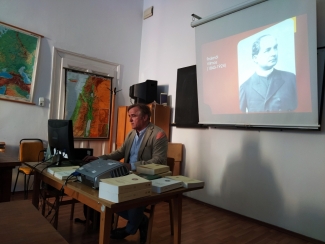
At the invitation of István Szijártó, professor of the Department of the History of Economy and Social History, Fraknói Research Group gave a presentation on its work at the ELTE BTK on 20 May. During the presentation, Péter Tusor, embedded in the historiography of Vatican research, presented the history of the Research Group, its operational framework and its achievements. In doing so, he referred to the volumes, of the Collectanea Vaticana Hungariae published so far, as well as to the international embeddedness of the research. Afterwards, Viktor Kanász presented how a university student can get involved in research, and in the context of a case study he presented the results of his doctoral research and the history of Girolamo Martinengo's nunciature. The presentation was concluded by a discussion on the current state of research in the Vatican, the fate of the Fraknó Villa, and the relationship of the Research Group with the Catholic University and other research groups.
2443 -
2022. June 3.
The latest volume of the Collectanea Vaticana Hungariae, containing a repertory of late medieval papal publications preserved in the archives of historical Hungary, has been published. The work, published as volume II/10 of the CVH, has identified 672 documentary texts hidden in more than a thousand charters from more than a hundred years between 1417 and 1526 in the archives of the Carpathian Basin. Using the manuscripts and editions collected during the research, a data set was compiled for each charter text, including the date, incipit, address, manuscripts preserving the text of the charter, and editions. The study of more than 300 original charters in the volume has also helped to compile a repertory of Curia officials, thus enabling it to contribute to the collection of prosopographies and biographies of the persons who worked in the Curia offices of the Papal States, which was begun decades ago by Thomas Frenz, a renowned professor of diplomacy and palaeography at the University of Passau. This handbook will be of use not only to scholars of ecclesiastical, political and social history, but also of diplomacy.
2470 -
2022. June 6.
To discuss the latest research results of the Fraknói Research Group, Vatican Radio hosted Péter Tusor, Tamás Fedeles, Tamás Kruppa, Gábor Nemes and the Research Group's Vatican Research Resident, Katalin Nagy. During the interview, senior research fellow and university professor Tamás Fedeles spoke in detail about his recently published book, the publication of his half-decade-long collection of material in the archives of the Apostolic Camera. Then Péter Tusor evaluated the 2017-2022 MTA/ELKH funded research grant period. He briefly presented the plans and goals of the Research Group for the new cycle (2022-2027) following the successful reapplication. He informed that the new Vatican-Hungarian series Collectanea Vaticana Hungariae , founded two decades ago, will publish by 2022 a total of 30 volumes of basic research results from the millennial history of relations between Hungary and the Holy See. In his view, all this means that the Research Group has become the depository of the intellectual heritage of Vilmos Fraknói. He also pointed out that the Roman institutional heritage of Fraknói is unfortunately still highly dysfunctional, as it does not fulfil the task that the founder had set for it. And this task, the founder and head of the Fraknói Research Group underlined, is none other than the systematic exploration and processing of the sources of Hungarian history from the Vatican Apostolic Archives and other Holy See archives. Paradoxically, the Fraknói Research Group is forced to organise its research in Rome as if the foundation of Vilmos Fraknói's research institution and the related donation of property to the Hungarian state had not taken place in 1913 - Péter Tusor drew attention to the problem that needs to be solved, and he provides the full historiographical context and documentation in his monograph on the history of research (CVH I/20).
The newest volumes of the Collectanea Vaticana Hungariae, now in Rome, and as usual deposited in the libraries of papal collections and universities, Italian and foreign institutions, are: Fedeles Tamás: Ordinationum Documenta Pontificia de Regnis Sacrae Coronae Hungariae (1426–1523). Ex Libris Formatarum Camerae Apostolicae collecta. Klerikusszentelések a Római Kúriában a Magyar Szent Korona országaiból (1426–1523). Az Apostoli Kamara Libri Formatarum bejegyzései, Nemes Gábor: Repertorium Pontificiorum Documentorum in Regnis Sacrae Coronae Hungariae existentium (1417–1526), Kruppa Tamás: Forgách Ferenc okmánytár. Levelek és iratok (1586–1615), valamint Tusor Péter: Monumenta és Collectanea. Magyar történeti kutatások a Vatikánban (1881–2021).
3378 -
2022. June 11.

On 9-10 June 2022, a two-day conference entitled The History of Church History in Hungary was held at the Faculty of Humanities of the University of Miskolc. Gábor Nemes, Tamás Kruppa, Viktor Kanász, Balázs Rétfalvi and György Sági represented the Frakno Research Group at the conference.
Gábor Nemes presented a paper entitled From Győr to Rome - Lajos Balics and Árpád Bossányi's Vatican research.
Afterwards, Viktor Kanász gave a lecture entitled The forgotten successors of Nuncio Burgio - The nuncios assigned to Ferdinand I and Hungarian historiography. He pointed out that in the early modern period, one of the most important key figures in the relations between the Holy See and Hungary were the nuncios sent to the monarch.
Tamás Kruppa presented Árpád Károlyi and the "First Austro-Hungarian Reconciliation", the work of Károlyi on the Bocskai Uprising.
Balázs Rétfalvi presented the life of the famous church historian Gyula Géfin in his lecture "The Historian of the Diocese of Szombathely".
In his lecture, György Sági gave an insight into the development of the Archives of the Conferences of Hungarian Monks' (MSZKL) and the structure of its archives.3375 -
2022. June 21.
At the invitation of András Koltai, President of the Hungarian Association of Ecclesiastical Archivists (MELTE), György Sági, research assistant of the Fraknói Research Group, also participated as a speaker at this year's conference. This year's event of the Hungarian ecclesiastical archivists, held between 20-22 June, took place at the D50 Cultural Centre in Budapest, owned by the Esztergom-Budapest Archdiocese.
György Sági gave a presentation on the second day of the event, in which he gave an insight into the development of the Hungarian Monks' Conferences Archives (MSzKL) and the structure of its archives. The archiving of the records started in the autumn of 2019, for which the Central Archives of the Hungarian Province of the Piarist Order provided the conditions.
In his presentation, György Sági spoke about the technical issues and aspects of the process of sorting the documents, as well as about the index created.3376 -
2022. July 2.
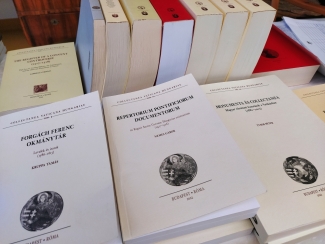
On July 1st 2022, the Fraknói Research Group participated in the annual event of the medievalists, represented by Gábor Nemes, Viktor Kanász and György Sági, as in the previous year. At this year's event, the Research Group's latest publications were also available for purchase, including the Monumenta and Collectanea, annotated by Péter Tusor, the Repertorium Pontificiorum Documentorum, compiled by Gábor Nemes, and the Ferenc Forgách Documentary Library, published by Tamás Kruppa.
3379 -
2022. July 15.
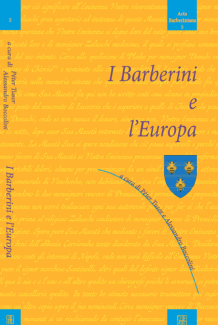
The 5th volume of the Acta Barberiniana, a series of the Istituto Nazionale di Studi Romani and the Università della Tuscia, is published in Viterbo. The series aims to publish and process the rich manuscript material of the Barberini dynasty of Pope Urban VIII (1623-1644), preserved in the Vatican, with a significant Central and Eastern European profile. Its founder and editor is Professor Gaetano Platania, a leading expert on early modern Holy See-Polish relations. The volume, edited by Péter Tusor and Alessandro Boccolini, presents the papers presented at the international symposium "I Barberini e l'Europa", held in December 2021 in collaboration with the Fraknói Research Group at the Istituto Nazionale di Studi Romani and online, and is the study book of the same title. Edizioni Sette Città's publication of more than 300 pages contains essays by 12 authors. The studies by Silvano Giordano, Olivier Poncet, Matteo Binasco, Giovanni Pizzorusso, Matteo Sanfilippo, the editors and others cover the foreign policy and ecclesiastical relations of the papal dynasty. Another important result and milestone of the Fraknói Research Group's active and ongoing scholarly presence in Rome, this volume of studies is available for download here for private use only. The book, which was published in Viterbo with the support of the Italian Ministero della Cultura, will be launched on 22 September 2022 at the Catholic University of Budapest.
3377 -
2022. August 9.
The Fraknói Summer Academy was held for the eighth time this year. This time, following the principle of "back to the roots", the event took place in Piliscsaba, the former campus of the Faculty of Humanities and Social Sciences of the Pázmány Péter Catholic University. The ELKH-PPKE-PTE Fraknói Vilmos Vatican Historical Research Group held its inaugural meeting on the eve of the Academy, as the opening of the new 5-year academic cycle, where the tasks and goals of the research group were discussed.
The scientific programme started on 5 August in the Avicenna Institute of Middle East Studies and continued on 6 August in the Pázmány Hall of the Stephaneum building, which is maintained by the Makovecz Campus Foundation, where scientific lectures were held in the former faculty banqueting hall.
The first day of the Academy was dominated by medieval and early modern themes. During the first day of the Academy, lectures were given by Dániel Bácsatyai, Norbert C. Tóth, Tamás Fedeles, Gábor Nemes, Tamás Kruppa, Béla Mihalik, Mons. Tamás Tóth, Balázs Rétfalvi and Rev. Máté Gárdonyi. At the end of the first day, Kornél Szovák held a panel discussion with Miklós Maróth, President of the ELKH.
On the second day, 6 August, topics ranging from the early modern period to the 20th century were presented. The speakers were Viktor Kanász, Péter Tusor, Róbert Oláh P., Katalin Nagy and György Sági.As is customary, the Academy closed with a Holy Mass celebrated by Mons. Tamás Tóth.
3382 -
2022. September 8.
The public defense of the doctoral thesis of Viktor Kanász, research fellow of the Fraknói Research Group, was held on September 7 at the University of Pécs. The dissertation, Hungary and the Holy See in the mid-16th century, was conducted by Péter Tusor and Tamás Fedeles. The subject of this dissertation is Hungary and the Holy See in the mid-16th century. Girolamo Martinengo nuncio and the Kingdom of Hungary (1550-1554). The opponents of the dissertation were Prof. Dr. István Fazekas (ELTE BTK Történeti Intézet) and Dr. György Laczlavik (MNL OL Elektronikus Nyilvántartások Főosztálya).
The dissertation was evaluated by the committee headed by Prof. Dr. Márta Font DSc professor emerita with summa cum laude (96,6 %). An extended version of the dissertation is expected to be published in book form as CVH Volume I/22.
The doctoral dissertation is available here.
3381 -
2022. September 15.
An important task of the Fraknói Research Group is to support the day-to-day scientific work of the Vatican Archives. This activity was already a feature of the years preceding the creation of CVH in 2002. The nature of this activity is described in the correspondence which can be read by clicking here The Prefect of the Vatican Apostolic Archives, Mons. Sergio Pagano, has requested, through his secretary, the identification of two Hungarian place names for the new publication of the Collectanea Archivi Vaticani. This publication will be a continuation of, Brevia communia et de Curia saec. XV Paulus II (1464–1471) (CAV 116), Città del Vaticano 2021.
3380 -
2022. September 19.
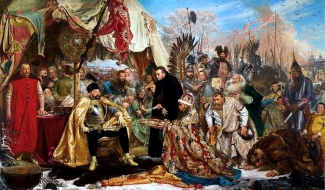
Stephen Bathory-Báthory István-Stefan Batory: Shape and Effect in International Comparison a conference on the reign of the Transylvanian prince and Polish king Báthory István (1571-1586) was held at the ELTE BTK between 14–16 September. Speakers from different countries presented their research results in 7 sessions, representing the same number of approaches. The Fraknói Research Group was represented by Tamás Kruppa, Senior Research Fellow, who gave a presentation in the Religious Policy section on 'Báthory und der Heilige Stuhl. Antitürkische Pläne und katholische Mission'. He presented the anti-Turkish league plans which he considered to be Báthory's life programme. For the grandiose offensive, launched simultaneously on land and sea, which was linked to the conversion of the Orthodox world, therefore the abolition of the great schism, he won the support of Gregory XIII and Sixtus V. The King's last detailed war plan, from 1586, is preserved in the manuscript of the Biblioteca Apostolica Vaticana under the title Parere di Stefano.
2648 -
2022. September 27.
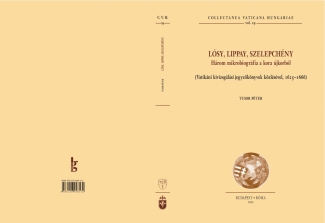
An important source base for the scientific work of the Fraknó Research Group is the 17th century canonical investigation records. Continuing the work begun with the publication of the processus informativus of Péter Pázmány (1616–163
7) (CVH II/6), this volume deals with Pázmány's three successors: Imre Lósy (1637–1642), György Lippay (1642–1666) and György Szelepchény (1666–1685).
The choice of topic of this new volume of Collectanea Vaticana Hungariae is justified by the decisive role played by the archbishops of Esztergom in the history of Hungarian church, society, society and culture during the early modern period. Starting from the paradigm of the publication of the Pázmány's canonical investigation, the book shows how, make it possible to learn about the origin, education, carrier and life of a high priest in early modern Hungary based on the widest possible source base, historical documents from Hungary (Carpathian Basin), Vienna, and Italy (Vatican). In other words, the Vatican sources, the canonical investigation records, provide special information for this purpose that cannot be found elsewhere. The present work does not illustrate all of this by way of comparative analyzes and examples, but rather by reviewing the entire life path biographically, or more precisely microbiographically, with a critical, especially source-critical demand.The book is available here.
2672 -
2022. September 23.
On 22 September 2022, the book „I Barberini e l’Europa” was presented in Budapest, in the Chapter Hall of the Central Seminary, in the framework of an international cooperation between Péter Tusor and Alessandro Boccolini. The book contains the work of twelve internationally renowned historians who have studied the Barberini period and the early modern era. Mentioned volume was based on the international conference of the same name held a year earlier in 2021. It is the fifth volume in the series Acta Barberiana, published by Sette Città in Viterbo. The book was presented by György Domokos, Italianist and lecturer in the Department of Italian Studies at the Pázmány Péter Catholic University, and Tamás Kruppa, Associate Professor at the University of Szeged and Senior Research Fellow at the Fraknói Research Group.
In his speech, Péter Tusor emphasised that the conference on the family of Pope Urban VIII (1623-1644), the Barberini, one of the most important early modern papal dynasties, was the outcome of an international conference held at the Istituto Nazionale di Studi Romani in Rome, which was also organised by the Fraknói Vilmos Roman History Research Group. This also explains the book's presentation in Budapest.
2675 -
2022. October 17.
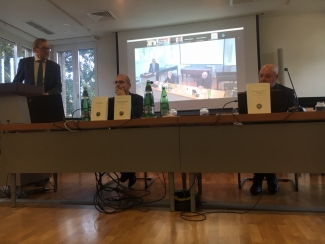
On 17 October 2022, the international launch of the latest publications of the Collectanea Vaticana Hungariae series (I/18, II/8, II/10) took place at the German Historical Institute in Rome (Deutsches Historisches Institut in Rom), organised by the host institution and the ELKH-PPKE-PTE Fraknói Vilmos Vatican Historical Research Group. The prestigious event was opened by Alexander Koller, Deputy Director of the German Historical Institute. In particular, he thanked Bishop Mons. Sergio Pagano, Prefect of the Vatican Apostolic Archives, for his contribution to the academic life of the German Historical Institute. He then welcomed the Italian, German, Austrian, French and Hungarian audiences present and gave a detailed presentation of the research work of the Fraknói Research Group. He summarised the results of the recently published volumes of the Collectanea Vaticana Hungariae, based on the discovery of new sources and focusing on the relations between the Holy See and Hungary. He indicated at the outset that the volume by Tamás Fedeles provides a detailed summary of the Roman ordination of clerics from the countries of the Hungarian Holy Crown between 1426 and 1523. Antonín Kalous's volume, with its exploration of the years of Angelo Pecchinoli's legation between 1488 and 1490, provides an excellent historical model for the history of the early modern nunciature. The third volume to be presented, the work of Gábor Nemes is a very useful repertory, collecting papal publications in the archives of the Carpathian Basin from the beginning of the pontificate of Pope Martin V until 1526, the DHI deputy director said.
The volume by Tamás Fedeles (Ordinationum Documenta Pontificia. Clerical Ordinations in the Roman Curia from the Countries of the Holy Crown of Hungary [1426-1523]) was presented by Andreas Rehberg, medieval researcher in charge at the German Historical Institute. Speaking about Fedeles' volume, he said that the historical period covered by the researcher clearly shows that with the spread of Christianity, the consecration of foreign clergy in the Roman Curia became increasingly frequent and massive.
Mons. Pagano has analysed in detail Kalous' volume on the papal legation of Angelo Pecchioli in the Hungarian royal court (1488-1490). He praised the work of the researcher, especially as the documents were researched using material from many archives other than the Vatican Archives (e.g. the State Archives of Milan, the Arcvhiwum Państwowe Poznań, the National Archives of the Hungarian National Archives, the Moravská Zemská Knihovna).
The Prefect then continued with a presentation of Gábor Nemes' Repertorium Pontificiorum Documentorum in Regnis Sacrae Coronae Hungariae existentium. He praised the excellent archival skills of the Senior Research Fellow of the Fraknói Research Group in preparing the descriptions of the Papal documents. As Rehberg had done earlier, Mons. Pagano also considered it important to specify that the lands of the crown of St Stephen covered a much larger area of Central Europe in the period than the present-day borders of the country. He underlined that the Vatican archives would also benefit from the volume, as it contains many of the original papal breves whose Vatican registers are either lost or have not been registered.The Hungarian researchers concerned then expressed their thanks, including to the German Historical Institute, which hosted the event, and to the Bishop-Prefect, who was present in person.
First of all, Tamás Fedeles, co-leader of the EKLH-PPKE-PTE Fraknói Research Group, spoke (Italian, Hungarian) expressing his particular pleasure at Andreas Rehberg's comments on his work.
He was followed at the podium by Gábor Nemes, Director of the Győr Diocesan Archives and Senior Research Fellow of the Fraknói Research Group. In his words of thanks (Italian, Hungarian) he referred to the rich Hungarian-related registrum collection of the Vatican Apostolic Archives and - referring back to Vilmos Fraknói - spoke in general about the large number of documents of Hungarian relevance.
Afterwards, Antonín Kalous joined the event online for a few minutes, expressing his thanks for the help he had provided and for the presentation of his work at the Rome event.
Finally, Péter Tusor, head of the Fraknói Research Group, in addition to thanking the German Historical Institute (DHI) and its staff for their cooperation, briefly outlined the past and present (Hungarian, Italian) of the Fraknói Research Group. He pointed out that the Collectanea Vaticana Hungariae series, which was established as a continuation of Vilmos Fraknói's Monumenta Vaticana Hungariae, has now contributed 30 volumes to the publication of the results of the Vatican's exploratory historical research.
The event concluded with a dinner hosted by the Director of the DHI.
2716 -
2022. October 24.
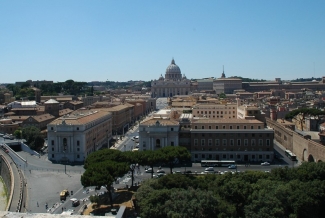
On the occasion of the presentation of the Collectanea Vaticana Hungariae volumes at the German Historical Institute in Rome, Gábor Nemes and Tamás Fedeles gave interviews to Vatican Radio.
You can listen to Gábor Nemes' interview here here (from 6:50) and Tamás Fedeles' here here (from 10:22).
3384 -
2022. November 9.
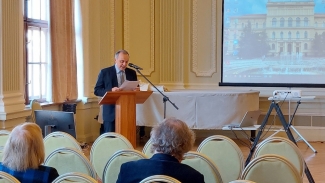
On 9th November 2022, the conference "The role of the Jesuit Order in the development and later operation of the University of Kolozsvár" was held in the Rector's headquarter at University of Szeged. The speakers gave an overview of the Jesuit Order in Transylvania from its beginnings in the 16th century to the 18th century, but the focus of the presentations was on the establishment of the Order in the 1580s. Presentations were given by Andrzej Paweł Bieś S.J. and Zoltán Koronkai S.J., as well as László Szögi and Apor Kis Pető.
Tamás Kruppa, Senior Research Fellow of the Fraknói Research Group, gave a lecture entitled "From Rome to Kolozsvár. Antonio Possevino and István Szántó (Arator) in Transylvania". The lecturer put the activities of Antonio Possevino and István Arator Szántó in Transylvania into a broader context of the work of the institution in Kolozsvár.3342 -
2022. November 21.
On 21 November, the VIIth academic workshop seminar of the Fraknói Research Group took place at Brenner János Theological College in Győr, where Gábor Nemes and Tamás Kruppa presented their research and the volumes presenting the results of their research.
The VIII Fraknói Summer Academy was also hosted by the College, where the audience was welcomed by Canon Zoltán Lukácsi. In his opening remarks, Péter Tusor stressed the importance for the Fraknói Research Group of the dissemination of Vatican research results both in the academic world in Rome (2018, 2019, DHI 2022) and at home. The first and the sixth of these were held at PTE, the second, third and fourth at PPKE and the fifth at SzTE, with a decisive direct link to university education.
The volume Repertorium Pontificiorum Documentorum in Regnis Sacrae Coronae Hungariae existentium (1417–1526) , which is the basis of the paper presented by Gábor Nemes at the workshop seminar in Győr, is a handbook whose main objective was to enumerate the papal publications (manuscript copies and editions) published between 1417 and 1526 and held in the archives of the Carpathian Basin.
Following the presentation of Gábor Nemes, Tamás Kruppa presented the political correspondence of Ferenc Forgách, Bishop of Nitra and Archbishop of Esztergom, which was published in the CVH volume II/9 , the final volume of the previous research period. The sources on which the research is based are scattered in several archives in Italy, Austria and Hungary, but most of them are kept in the Vatican Apostolic Archives and the State Archives of Biella. What is interesting about this edition is that it contains not only the letters written to Forgách or by him on political topics, but also the thematically related nuncial reports and other letters about Forgách: the importance of this is shown by the fact that, of the 212 documents in the volume, 92, with few exceptions, unpublished Forgách letters are accompanied by 75 reports, mostly written by nuncios.
The event was closed by Tamás Fedeles, who drew the audience's attention to the positive reception in Rome of the Research Group's volumes. At the same time, he invited everyone to the presentation on 13 December of the new volume of studies on Hungary and the Holy See of Rome III (CVH I/21, Bp.-Rome 2022), which will publish the lectures of the VIII Summer Academy in Fraknói.
2863 -
2022. December 4.
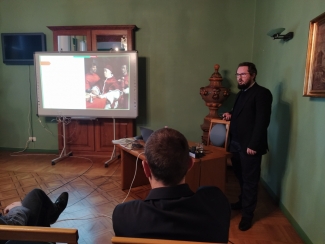
On 2 December 2022, a conference was organised in the building of the Pécs Regional Committee of the Hungarian Academy of Sciences, co-organised by the Fraknói Research Group, to present the latest research results on the Battle of Mohács (1526). Tamás Fedeles participated in the conference as section chairman, Gábor Nemes, Tamás Kruppa and Viktor Kanász as speakers.
In his presentation, Gábor Nemes analysed the development of Papal-Hungarian relations between 1521 and 1526 from the perspective of the Apostolic See.
Tamás Kruppa gave a lecture entitled "Additions to the History of the Venetian-Hungarian-Papal Alliance of 1501". With the help of a recently discovered Bologna codex, which contains reports by the Venetian ambassador Sebastiano Giustinian and his envoys who were in Buda between 1500 and 1502, we can reconstruct the negotiations leading to the treaty in greater detail than ever before.
Viktor Kanász gave a presentation on a misunderstood source and one that is still unknown to researchers, showing what János Szalánci and Pietro Duodo knew and how they felt about the Battle of Mohács and the death of King Louis II.3385

